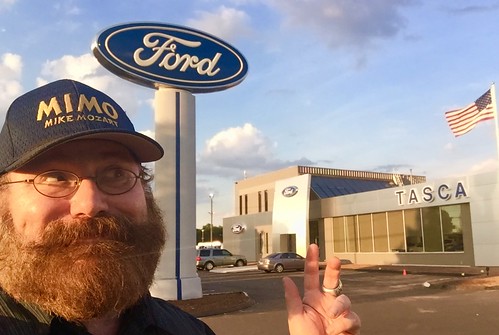Ford accused of selling hybrids at risk of spontaneous fire
Ford #Ford

Six customers are suing Ford Motor Co. because they allege the company sold hybrid vehicles with faulty engines, leading to “catastrophic cars fires”, according to a lawsuit filed this week in U.S. District Court in Detroit.
The 124-page document claims the Michigan-based auto manufacturer “knew or should have known of the stall and fire risk prior to launching the vehicles” — 2020-2023 Ford Hybrid Escapes, 2022-2023 Ford Hybrid Mavericks and 2021-2023 Lincoln Hybrid Corsairs — and did not act to timely warn car owners.
The car models, which contain 2.5-leter hybrid electric vehicle and 2.5-liter plug-in electric vehicle engines, can suffer a “block breach,” according to the lawsuit. This occurs when the engine seizes and shatters the rods and connected bearings, which can thrust through the engine block or the oil pan, causing oil or fuel vapor leaks and pools where it is at risk of ignition, potentially causing spontaneous hood smoke or fires.
Warranty claims related to the fire risk were made to Ford as early as April 2021, the lawsuit said. It further alleges, although Ford issued recalls in March and July 2022 and reportedly developed a solution to prevent more fires, the company did not inspect the engines to decisively know which car had the defects to properly address the issue.
Instead, Ford removed the shutter blinds and drilled holes in the engine shield “in an attempt to mitigate the risk that fluids and vapors expelled from the blown engines will ignite, while leaving the vapors and fluids themselves to run onto the roadways, or onto vehicle owners’ driveways and garages,” the lawsuit claims.
“Choosing profits over safety, Ford chose not to inspect the engines to locate and replace those that were defectively manufactured,” the lawsuit states.
However, another recall report submitted by Ford in May to the National Highway Traffic Safety Administration and provided to MLive reveals the company is currently developing a remedy, expected to be available in the third quarter of 2023.
“We expected the initial repair to be effective, but continued to monitor the performance of the vehicles and reacted responsibly as facts developed,” reads a Ford statement. “We’ve now learned that some customers continued to drive on the alternative hybrid electric system even after an engine block breach, and so we are notifying customers to park the vehicle if what’s known as a ‘block breach’ occurs. Our team is working earnestly to resolve the issue and meet the needs of our customers.”
Prior to the original recall, the lawsuit says Ford admitted to at least 23 reports of hood fires or smoke. A Ford spokesperson noted that there are no known injuries or deaths as a result of these incidents.
The plaintiffs in the lawsuit, submitted by Seattle-based law firm Hagens Berman Sobol Shapiro LLP, are: Todd Nishon of California, Harry Hilburg of Missouri, Raymond Dyne III of Nebraska and William Simmons of Wisconsin and Joseph Vaillancourt and James Capps of Arizona.
Nishon purchased a 2021 Escape Titanium Hybrid in November of that year. Once he received a recall notice from Ford, he asked the dealership performing an oil change on the car if workers could complete the repairs. He was told the dealership couldn’t do so, as the lawsuit claims there was only one person who could do the work and that person only works certain days. The dealership did not schedule a day for Nishon to have the repair completed. It was only a month later in October 2022 that the car “exploded into flames,” which Nishon was “fortunate to escape.”
After regular use, Capps and his wife were driving his 2021 Ford Escape Hybrid from Kingman, Arizona to Mesquite, Nevada in April 2022, when he noticed his vehicle wasn’t driving properly. He turned the vehicle around to go back to Kingman when he noticed smoke coming from under the car. The car gave the message “zero oil pressure” and “engine shut down.” Capps pulled over and shut off the car as another driver began to yell at him and his wife to get out of the vehicle as it was on fire.
“The vehicle was totally consumed by the fire within about 15 minutes,” the lawsuit states.
The other plaintiff’s had similar stories, having unknowingly purchased one of the recalled vehicles. They either had their car fixed following the recalls or ran into problems at the dealership while attempting to do so, and are now concerned with the potential fire hazard.
According to the lawsuit, all plaintiffs were admittedly familiar with Ford’s marketing tactics. The company touts its vehicles as reliable and safe, but the customers were not told of the fire risk before purchasing the car.
The plaintiffs are seeking class-action status nationally and in the plaintiff’s individual states, restitution for the purchase or overpayment of the vehicles, a court order prohibiting “Ford’s deceptive acts or practices” and the collection of other costs or fees.
Read more from MLive:
Three Republicans charged after spat, fight at GOP functions in Clare hotel
All 16 pro-Trump electors have pleaded not guilty to Michigan felony charges
To combat puppy mills, Michigan bill would stop dog sales at pet shops
Endangered piping plovers flourish under tribe’s watch on remote Lake Michigan island